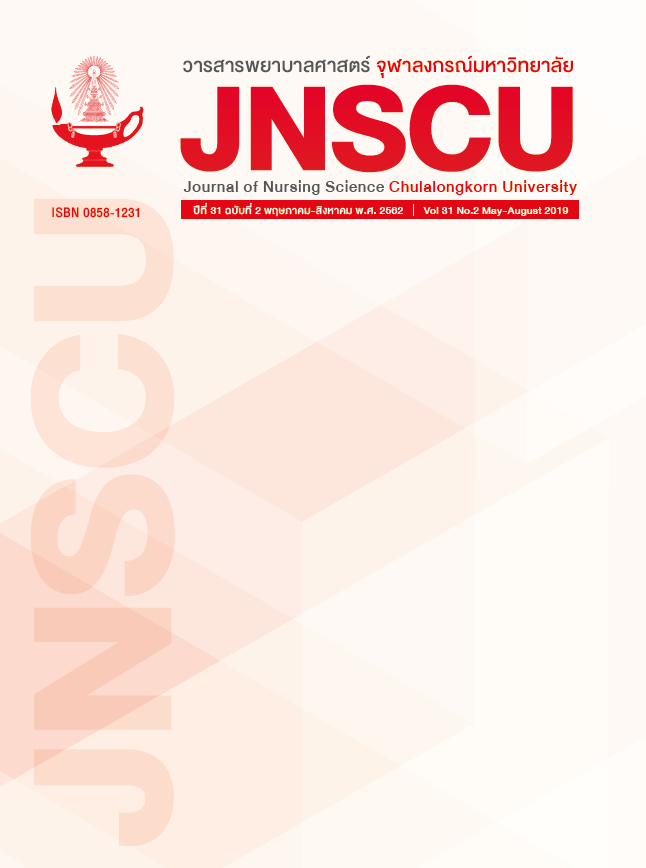ผลของโปรแกรมปรับเปลี่ยนพฤติกรรมตามแผนต่อพฤติกรรมการบริโภคอาหารและการทำกิจกรรมทางกายของเด็กวัยเรียนตอนปลายที่มีภาวะน้ำหนักเกิน
คำสำคัญ:
โปรแกรมปรับเปลี่ยนพฤติกรรมตามแผน, เด็กวัยเรียนตอนปลาย, พฤติกรรม การบริโภคอาหาร, พฤติกรรมการทำกิจกรรมทางกาย, ภาวะน้ำหนักเกินบทคัดย่อ
วัตถุประสงค์: เพื่อศึกษาผลของโปรแกรมปรับเปลี่ยนพฤติกรรมตามแผนต่อพฤติกรรมการบริโภคอาหารและ
การทำกิจกรรมทางกายของเด็กวัยเรียนตอนปลายที่มีภาวะน้ำหนักเกิน
แบบแผนงานวิจัย: การวิจัยกึ่งทดลอง
วิธีดำเนินการวิจัย: การศึกษาครั้งนี้ประยุกต์ใช้ทฤษฏีพฤติกรรมตามแผน กลุ่มตัวอย่างคือ เด็กวัยเรียนตอนปลาย
ที่มีภาวะน้ำหนักเกิน ระดับอ้วน อายุ 10–12 ปี ที่กำลังศึกษาในโรงเรียนสังกัดรัฐบาล จังหวัดสระบุรี คัดเลือก
กลุ่มตัวอย่างตามคุณสมบัติตามเกณฑ์ และสุ่มตัวอย่างอย่างง่ายเข้ากลุ่มทดลองและกลุ่มควบคุม โดยกลุ่มทดลอง
ได้รับโปรแกรมปรับเปลี่ยนพฤติกรรมตามแผนเป็นระยะเวลา 6 สัปดาห์ จำนวน 35 คน และกลุ่มควบคุมได้รับ
การดูแลตามปกติ จำนวน 35 คน เครื่องมือที่ใช้ ได้แก่ โปรแกรมปรับเปลี่ยนพฤติกรรมตามแผนเด็กวัยเรียนตอนปลาย
ที่มีภาวะน้ำหนักเกิน แบบสอบถามพฤติกรรมการบริโภคอาหาร และพฤติกรรมการทำกิจกรรมทางกาย วิเคราะห์
ข้อมูลด้วยสถิติเชิงพรรณนา และสถิติทดสอบค่าที
ผลการวิจัย: หลังการทดลองกลุ่มทดลองมีคะแนนเฉลี่ยพฤติกรรมการบริโภคอาหารและพฤติกรรมการทำกิจกรรม
ทางกายสูงกว่าก่อนทดลองอย่างมีนัยสำคัญทางสถิติ (p < .01) และกลุ่มทดลองมีคะแนนเฉลี่ยพฤติกรรมการบริโภค
อาหารและพฤติกรรมการทำกิจกรรมทางกายสูงกว่ากลุ่มควบคุมอย่างมีนัยสำคัญทางสถิติ (p < .01)
ข้อสรุป: พยาบาลสามารถนำโปรแกรมปรับเปลี่ยนพฤติกรรมตามแผนไปใช้ โดยประสานงานร่วมกับครูและผู้ดูแลหลักเพื่อส่งเสริมให้เด็กที่มีภาวะน้ำหนักเกินมีพฤติกรรมที่เหมาะสมต่อไป
เอกสารอ้างอิง
International Obesity Task Force. A simple guide toclassifying body mass index in children.2014.Retrieved June18,2017, Retrieved from http://www.noo.org.uk/uploads/doc/vid_11601_A_simple_guide_to_classifying_BMI_in_children.pdf.
Ministry of Public Health. Promotion & PreventionExcellence[Internet].Bangkok: Ministry of Public Health; 2018 [cited 2019 Mar 12]. Available from: https://hdcservice. moph.go.th/hdc/main/index_pk.php. (In Thai)
Hockenberry MJ, Wilson D. Wong’s NursingCare of infants and children. 9th ed. St Louis: Mosby/Elsevier; 2011.
Chaiyasung P, Yakasem P, Chuthongrat N. Factors predicting food consumption behaviors of overweight elementary school students,grade4-6.TheJournal of Boromarajonani College of Nursing,Nakhonratchasima 2014;20(1):30-43. (In Thai)
AmornsriwatanakulA,NakornkhetK,Katewongsa P, Choosakul C,KaewmaneeT,Konharn K, Purakom A, et al. Results from Thailand’s2016reportcard on physical activity for childrenand youth. Journal of Physical Activity and Health 2016; 13(2):S291-8.
World Health Organization. Global Recommendationson Physical Activity for Health. Geneva:Blossoming. it;2010.
Noin K. Overweight and obesity among Thai school-aged childrenand adolescents. Journalof The Royal Thai Army Nurses 2017;18(1):1-8. (In Thai)
Ounnapiruk L, Leelahakul V, Bunnag A, Autthakornkovit C. The effects of a health promotion program on the
physical activity in overweight primary school children. Journal of Nursing Science 2011;29(2):15-26. (In Thai)
Pichairat A, Tato R, Rodcumdee B. Effect of healthalliancenursing programonfood consumptionand exercise behaviors in obese school age children. Journal of Boromarajonani College of Nursing, Bangkok 2013;29(1):121-34. (In Thai)
Rosario R, Oliveira B, Araujo A, Lopes O, Padrao P, Moreira A, et al. The impact of an intervention taught by trained teachers on childhood overweight. International Journal of Environment Research and public Health 2012; 9(4):1355-67.
Yaemmen P, Duangsong R. The effects of health promotion program by application of Health Belief Model
and Social Support on behavioral modification for weight control among overweightstudentsat level5of primary
school, Muang District, Phitsanulok Province.KKUResearchJournal (Graduate Studies) 2012;12(1):57-67. (In Thai)
Chaisri J, Klungtumneim K, Buajarean H. Clinical nursing practice guideline for management of obesity in children: the synthesis of thesis. Journal of The Royal Thai Army Nurses 2014;15(2):
-7. (In Thai)
Ajzen I. The theory of planned behavior. Organizational behavior and human decision processes 1991;50(2):179-211.
Orathai P, Phumonsakul S. Power analysis and sample size estimation usingG*Power program. Bangkok:pimdee; 2013.
Chunechit C, Duangsong R. Effects of a health promotion program for weight controlamong primaryschool student, level 4-6, Mueang district, Khon Kaen province.KKU Journal for publichealth Research 2013;6(4):1-9. (In Thai)
Srisatidnarakul B. The methodology in nursing research. 5th ed. Bangkok: U & I intermedia; 2010.
Choojan S, Thongbai W, Kummabutr J. Theeffect of self- efficacy family support promotion program on consumption behavior among late school- aged children with overweight. Journal of Boromarajonani College of Nursing,Bangkok 2016;32(1):31-43. (In Thai)
Amornsriwatanakul A, Bull F, Rosenberg M. Thailand Physical Activity Children Survey–Version 10-13 (TPACS V10-13) [Internet]. Perth: Thailand Physical ActivityResearch Centreand University of Western Australia; 2015 [cited2017 Feb 9]. Available from: http://padatabase.net/uploads/files/uploads/1499146003-StudentQ1013Final
CoveringTH.pdf
Tuntiakara S, Thongbai W, Takviriyanun N.Theeffectivenessofobesity prevention program oneatingand physicalactivity behaviors among overweight school aged children.JournalofBoromarajonani College of Nursing, Bangkok 2015; 31(3):47-61. (In Thai)
InstituteofMedicalResearchand Technology Assessment, Ministry of Public Health. Clinical practiceguidelineof preventing and caring obesity. Bangkok: The agriculturalco-operativefederalofThai
and Ltd; 2010. (In Thai)



